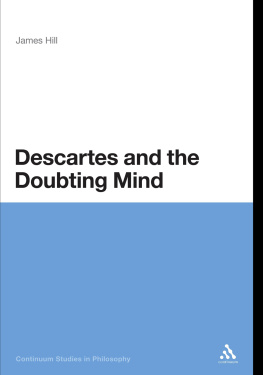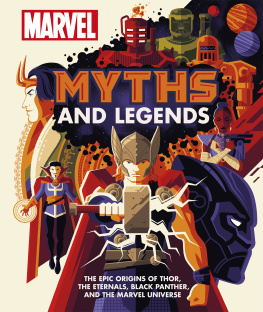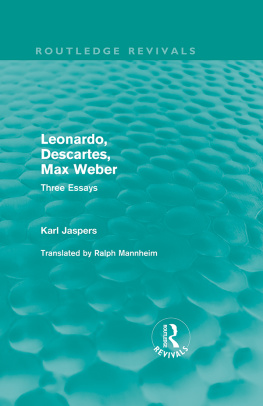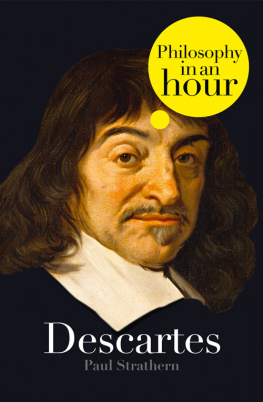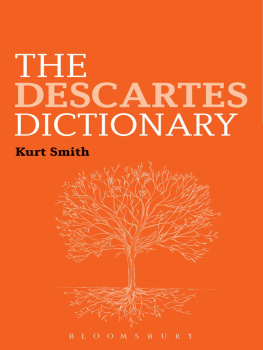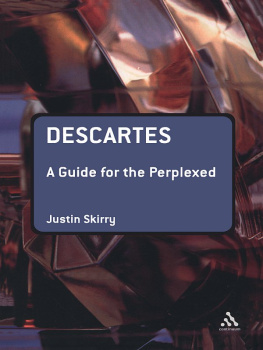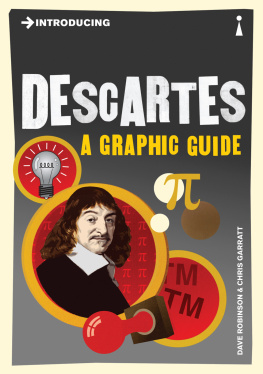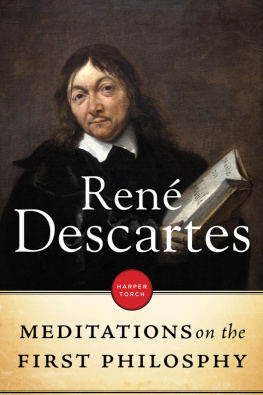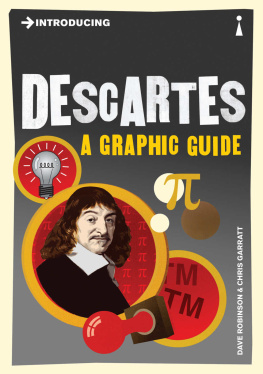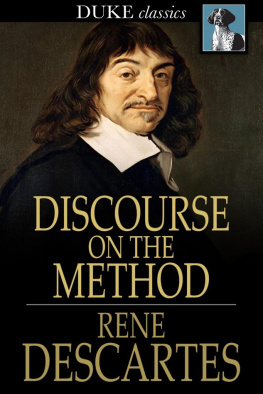James Hill - Descartes and the Doubting Mind
Here you can read online James Hill - Descartes and the Doubting Mind full text of the book (entire story) in english for free. Download pdf and epub, get meaning, cover and reviews about this ebook. year: 2011, publisher: Bloomsbury UK, genre: Religion. Description of the work, (preface) as well as reviews are available. Best literature library LitArk.com created for fans of good reading and offers a wide selection of genres:
Romance novel
Science fiction
Adventure
Detective
Science
History
Home and family
Prose
Art
Politics
Computer
Non-fiction
Religion
Business
Children
Humor
Choose a favorite category and find really read worthwhile books. Enjoy immersion in the world of imagination, feel the emotions of the characters or learn something new for yourself, make an fascinating discovery.
- Book:Descartes and the Doubting Mind
- Author:
- Publisher:Bloomsbury UK
- Genre:
- Year:2011
- Rating:4 / 5
- Favourites:Add to favourites
- Your mark:
- 80
- 1
- 2
- 3
- 4
- 5
Descartes and the Doubting Mind: summary, description and annotation
We offer to read an annotation, description, summary or preface (depends on what the author of the book "Descartes and the Doubting Mind" wrote himself). If you haven't found the necessary information about the book — write in the comments, we will try to find it.
Descartes and the Doubting Mind — read online for free the complete book (whole text) full work
Below is the text of the book, divided by pages. System saving the place of the last page read, allows you to conveniently read the book "Descartes and the Doubting Mind" online for free, without having to search again every time where you left off. Put a bookmark, and you can go to the page where you finished reading at any time.
Font size:
Interval:
Bookmark:
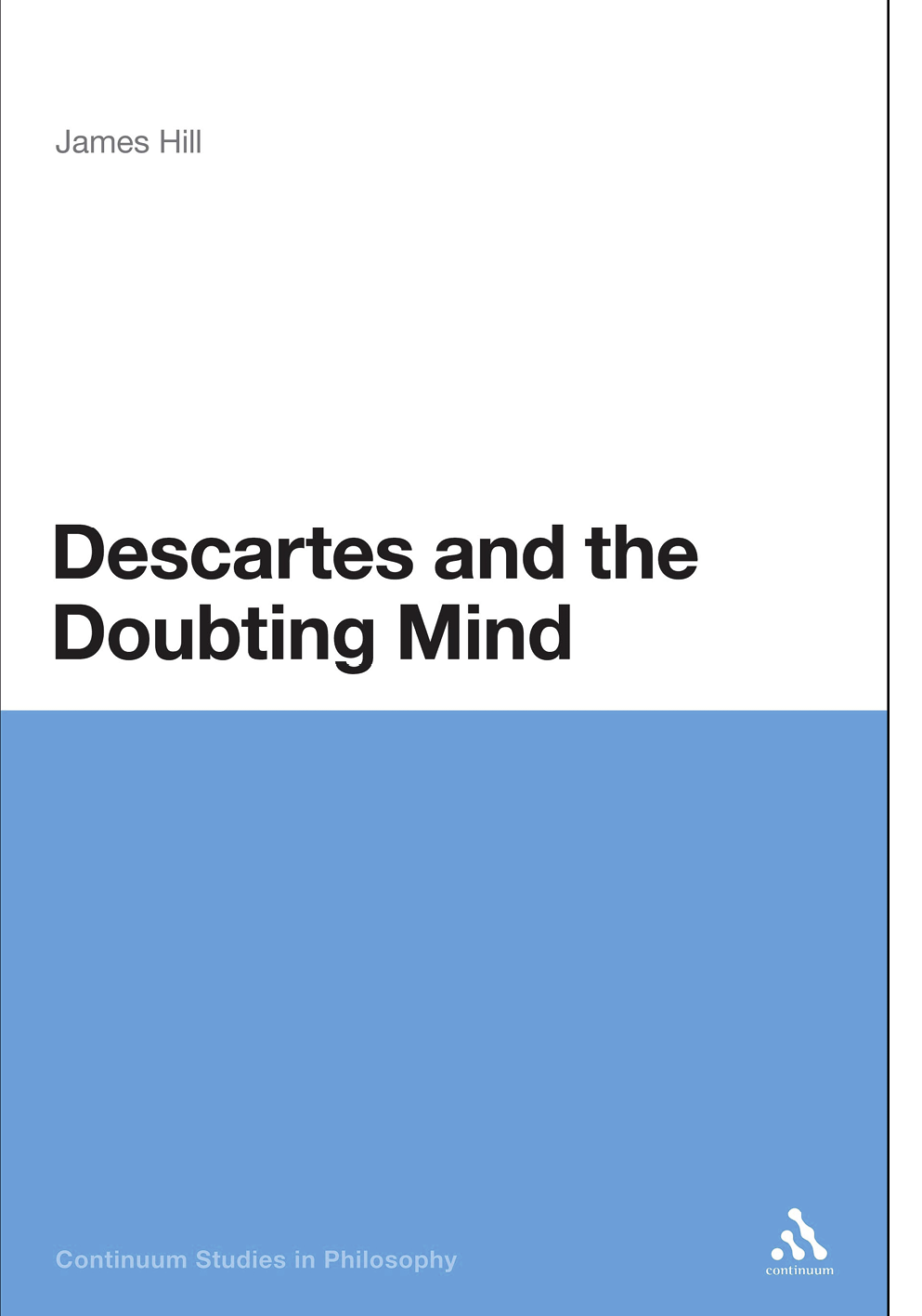
Continuum Studies in Philosophy
Series Editor: James Fieser, University of Tennessee at Martin, USA
Continuum Studies in Philosophy is a major monograph series from Continuum. The series features first-class scholarly research monographs across the whole field of philosophy. Each work makes a major contribution to the field of philosophical research.
Aesthetic in Kant , James Kirwan
Analytic Philosophy: The History of an Illusion, Aaron Preston
Aquinas and the Ship of Theseus , Christopher Brown
Augustine and Roman Virtue , Brian Harding
The Challenge of Relativism , Patrick Phillips
Demands of Taste in Kants Aesthetics, Brent Kalar
Descartes and the Metaphysics of Human Nature , Justin Skirry
Descartes Theory of Ideas , David Clemenson
Dialectic of Romanticism , Peter Murphy and David Roberts
Duns Scotus and the Problem of Universals , Todd Bates
Hegels Philosophy of Language , Jim Vernon
Hegels Philosophy of Right , David James
Hegels Theory of Recognition , Sybol S. C. Anderson
The History of Intentionality , Ryan Hickerson
Kantian Deeds, Henrik Jker Bjerre
Kierkegaard, Metaphysics and Political Theory , Alison Assiter
Kierkegaards Analysis of Radical Evil , David A. Roberts
Leibniz Re-interpreted , Lloyd Strickland
Metaphysics and the End of Philosophy , H. O. Mounce
Nietzsche and the Greeks , Dale Wilkerson
Origins of Analytic Philosophy , Delbert Reed
Philosophy of Miracles , David Corner
Platonism, Music and the Listeners Share , Christopher Norris
Poppers Theory of Science, Carlos Garcia
Rationality and Feminist Philosophy , Deborah K. Heikes
Role of God in Spinozas Metaphysics , Sherry Deveaux
Rousseau and the Ethics of Virtue , James Delaney
Rousseaus Theory of Freedom , Matthew Simpson
Spinoza and the Stoics , Firmin DeBrabander
Spinozas Radical Cartesian Mind , Tammy Nyden-Bullock
St. Augustine and the Theory of Just War , John Mark Mattox
St. Augustine of Hippo , R. W. Dyson
Thomas Aquinas & John Duns Scotus , Alex Hall
Tolerance and the Ethical Life , Andrew Fiala
Descartes and the Doubting Mind
James Hill
Continuum Studies in Philosophy

Continuum International Publishing Group
The Tower Building | 80 Maiden Lane |
11 York Road | Suite 704 |
London SE1 7NX | New York NY 10038 |
www.continuumbooks.com
James Hill 2012
All rights reserved. No part of this publication may be reproduced or transmitted in any form or by any means, electronic or mechanical, including photocopying, recording, or any information storage or retrieval system, without prior permission in writing from the publishers.
James Hill has asserted his right under the Copyright, Designs and Patents Act, 1988, to be identified as Author of this work.
Research on this book was supported by the Czech government grant project Formal and Historical Approaches to Epistemology, GAR, no. P401/10/1504.
British Library Cataloguing-in-Publication Data
A catalogue record for this book is available from the British Library.
ISBN: 9781441113108
Library of Congress Cataloging-in-Publication Data
Hill, James.
Descartes and the doubting mind / James Hill.
p. cm. -- (Continuum studies in philosophy)
Includes bibliographical references.
ISBN 9781441132031 ISBN 9781441179869 ISBN 9781441113108 1. Descartes, Ren, 15961650. 2. Philosophy of mind-History-17th century. I. Title. II. Series.
B1878.M55H55 2011
194-dc23
2011028610
Typeset by Fakenham Prepress Solutions Ltd, Fakenham, Norfolk NR21 8NN
Our doubts depend on the fact that some propositions are exempt from doubt they are as it were like hinges on which the doubts turn.
Ludwig Wittgenstein, On Certainty
Contents
Acknowledgements
I have had the good fortune to have enjoyed discussions about this book and its themes with many different people. In particular I would like to thank Margaret Atherton, Daniel Friesner, Petr Glombek, Pavel Kouba, John Milton, Samuel Rickless, Anthony Savile and Adrian Weddell, all of whom provided valuable comments in conversation or correspondence. I would like to thank Tom Marvan and Milan Sobotka for their reactions, published in Czech, to some of the key theses put forward here their critical perspectives have, I hope, helped me to improve the accuracy of my reading of Descartes. I am very grateful to my colleagues who read earlier drafts of the book. Timothy Childers gave me the benefit of his sharp eye for the weakest links in my arguments throughout the book; Tom Marvan made detailed and valuable comments to each chapter; Jan Palkoska led me, in particular, to reassess my interpretation of the scientific background of Descartes thought; and I am especially indebted to Marina Barabas for her criticisms as well as for our wide-ranging discussions which led me to see the central philosophical issues in a new light. I thank my students at Charles University for their questions and reactions that frequently called me back from the arcane scholarly disputes to consider the overall merits and demerits of Descartes philosophy of mind. All these people have helped me improve what I offer to the reader, but I, of course, am responsible for the mistakes and imperfections that inevitably remain. Finally, let me thank my family Anna, Marsha and Thomas for putting up with my Cartesian meditations for so long. It is to them that I dedicate this book.
Bibliographical Note
I use the style AT IXII 63 to refer to volumes and page numbers of Oeuvres de Descartes , edited by Charles Adam and Paul Tannery (Vrin, 1996). CSM III 63 refers to the (first two) volumes and page numbers of The Philosophical Writings of Descartes , translated by John Cottingham, Robert Stoothoff and Dugald Murdoch, (Cambridge University Press, 1985) and CSMK 63 to the third volume of the same title, for which Anthony Kenny also translated material. Occasionally I depart from these translations and in such cases I indicate to the reader that the translation has been amended. Once or twice I have drawn on the older English translation of Descartes works: The Philosophical Works of Descartes (2 volumes), translated by Elizabeth Haldane and G. R. T. Ross (Cambridge University Press, 1934), which I refer to as: HR I 63.
Chapter I
Introduction
1. The Aims of the Book
One of Ren Descartes central and most well-known philosophical theses is that the mind is a thinking thing or res cogitans . This characterization of the mind is so striking and simple that it may seem to call for little in the way of interpretation. It may even look like a statement of the obvious what else could the mind be other than a thing which thinks? This book is written in the conviction that it is actually not obvious what Descartes means by a thinking thing and his meaning only becomes clear on careful investigation of his metaphysics and particularly of the method of doubt with which it is introduced. I shall be primarily concerned here with how Descartes thinking thing is related to his understanding of the intellect, of sensation, and of consciousness.
It is one aim of my interpretation to show that we cannot appreciate Descartes concept of the mind if we do not see how he is seeking to overcome an empiricist framework. Descartes thought that a sense-based approach to the mind and its abilities was so widespread and familiar at the time he was writing that it had become second nature to philosophers. He thought that this empiricist viewpoint not only overestimated the epistemic importance of sense perception in our finding out about the world, but that it also misunderstood the very nature of thought itself. One reason he was particularly concerned to free himself from empiricism, I shall argue, was because he felt it was an obstruction to the establishment of a new science of nature. He held that to understand the natural world we need to have a non-sensual conception of thought, and such a conception requires a mind that is, in its essence, an intellectual being.
Next pageFont size:
Interval:
Bookmark:
Similar books «Descartes and the Doubting Mind»
Look at similar books to Descartes and the Doubting Mind. We have selected literature similar in name and meaning in the hope of providing readers with more options to find new, interesting, not yet read works.
Discussion, reviews of the book Descartes and the Doubting Mind and just readers' own opinions. Leave your comments, write what you think about the work, its meaning or the main characters. Specify what exactly you liked and what you didn't like, and why you think so.

